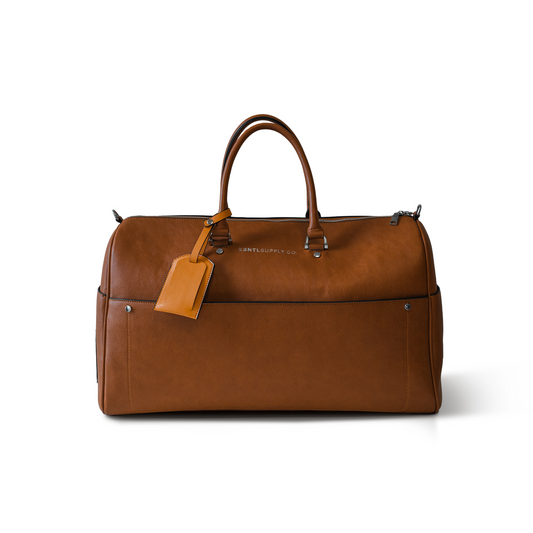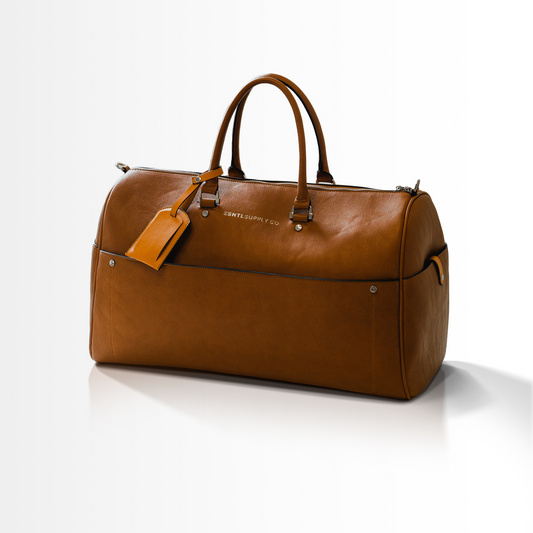I. Introduction
A. Explanation of Vegan Leather
Vegan leather is a man-made material that is designed to resemble the look and feel of real leather but is made from non-animal sources. This alternative material offers a range of benefits, including being more sustainable and ethical than traditional leather.
B. Purpose of the article
The purpose of this article is to provide a comprehensive overview of vegan leather, including its definition, comparison to traditional leather, production process, properties, and benefits. Additionally, the article will address common misconceptions about vegan leather and encourage further exploration of this alternative material.
II. What is Vegan Leather?
A. Definition of vegan leather
Vegan leather is a term used to describe a material that is designed to look and feel like traditional leather, but is made from alternative materials that are free from animal products. Vegan leather can be made from synthetic materials, such as polyurethane (PU) or polyvinyl chloride (PVC), or from plant-based materials, such as cork, mushrooms, or pineapple fibers.
B. Comparison between vegan leather and traditional leather
Traditional leather is made from animal hides, typically from cows, and is treated with various chemicals to preserve and soften the material. Vegan leather, on the other hand, is made from alternative materials and does not involve the use of animal products or the negative impacts of the animal agriculture industry.
When comparing vegan leather and traditional leather, there are several key differences to consider, including:
Environmental impact: Traditional leather production is a highly resource-intensive and environmentally damaging process, involving the clearing of land for animal agriculture, the use of chemicals and pollutants in the tanning process, and the generation of waste and by-products. Vegan leather production, on the other hand, can be much more environmentally friendly, reducing the carbon footprint of the production process and utilizing more sustainable materials and methods.
Durability: Traditional leather is known for its durability and longevity, but vegan leather can also be made to be highly durable and long-lasting. This will depend on the quality of the materials used and the production process, but many vegan leather products are made to be as durable as traditional leather.
Cost: Traditional leather is often more expensive than vegan leather due to the cost of animal hides, the production process, and the additional treatments required to preserve and soften the material. Vegan leather is typically more affordable, making it an accessible and affordable alternative to traditional leather.

C. Examples of products made from vegan leather
Vegan leather can be used to make a wide range of products, including:
Bags: Vegan leather can be used to make backpacks, totes, handbags, and more, offering a sustainable and ethical alternative to traditional leather bags.
Clothing: Vegan leather can be used to make jackets, pants, skirts, and more, offering a stylish and sustainable alternative to traditional leather clothing.
Accessories: Vegan leather can be used to make belts, wallets, cardholders, and more, offering a versatile and affordable alternative to traditional leather accessories.
Footwear: Vegan leather can be used to make shoes, sandals, boots, and more, offering a comfortable and cruelty-free alternative to traditional leather footwear.

III. What is Vegan Leather Made Of?
A. Explanation of synthetic materials used
Vegan leather can be made from synthetic materials, such as polyurethane (PU) or polyvinyl chloride (PVC). These materials are designed to mimic the look and feel of traditional leather, and they can be made to be highly durable and long-lasting. Synthetic vegan leather is typically produced using a casting process, in which a mold is used to shape the material into the desired form.
B. Overview of plant-based leather materials
Vegan leather can also be made from plant-based materials, such as cork, mushrooms, or pineapple fibers. These materials are renewable, biodegradable, and offer a more sustainable alternative to synthetic vegan leather. Plant-based vegan leather is typically produced using a process similar to traditional leather tanning, in which the fibers are treated to create a soft and durable material.
C. Comparison between synthetic and plant-based materials
When considering synthetic and plant-based vegan leather materials, there are several factors to consider, including:
Environmental impact: Synthetic vegan leather is typically made from petrochemicals, which are non-renewable and can have a negative impact on the environment during production and disposal. Plant-based vegan leather, on the other hand, is made from renewable materials that have a much lower environmental impact.
Durability: Synthetic vegan leather can be highly durable and long-lasting, but it may not be as breathable as plant-based materials, which can affect the comfort of the product. Plant-based vegan leather is also known for its durability and long-lasting qualities, but it may be more expensive to produce than synthetic materials.
Cost: Synthetic vegan leather is typically more affordable than plant-based materials, but this may change as plant-based vegan leather production becomes more widespread.
Feel: Synthetic vegan leather can feel very similar to traditional leather, but it may not be as soft and supple as plant-based materials. Plant-based vegan leather has a more natural feel, but it may not be as durable as synthetic materials.
IV. Is Vegan Leather as Good as Real Leather?

A. Comparison between the durability of vegan and traditional leather
The durability of vegan leather can vary, depending on the quality of the materials and the production process. However, many vegan leather products are made to be as durable as traditional leather, and some can even be more durable than traditional leather due to the use of high-quality synthetic materials.
B. Personal preferences and use case
Ultimately, the choice between vegan leather and traditional leather will come down to personal preference and the intended use of the product. For example, someone who is looking for a durable and long-lasting product may prefer vegan leather, while someone who is looking for a soft and supple material may prefer traditional leather.
C. Sustainable and ethical alternatives
Vegan leather is often considered a more sustainable and ethical alternative to traditional leather, as it does not involve the use of animal hides or contribute to the negative impacts of the animal agriculture industry. Vegan leather can be made from recycled materials, reducing waste and preserving natural resources, and it can be produced in a more environmentally friendly manner, reducing the carbon footprint of the production process. Additionally, vegan leather is a more ethical choice as it does not involve the use of animal hides and eliminates the cruelty and exploitation involved in the leather industry.
V. Is Vegan Leather Just Fake Leather?

A. Explanation of the term "fake leather"
The term "fake leather" is often used to describe materials that are made to look and feel like traditional leather, but are not actually made from animal hides. The term is often used to describe lower-quality materials that are not durable or long-lasting. However, this term is misleading when it comes to vegan leather, as vegan leather is not simply a "fake" version of traditional leather. Instead, it is a distinct material with its own unique properties and characteristics.
B. Characteristics and properties of vegan leather
Vegan leather has a range of characteristics and properties that make it different from traditional leather. For example, vegan leather is often more durable and long-lasting than traditional leather. This is because vegan leather can be made from synthetic materials that are designed to withstand wear and tear, and can also be treated with protective coatings to increase its resistance to damage.
Vegan leather can be made from a variety of materials, including synthetic and plant-based materials. Synthetic vegan leather is often made from polyurethane or polyvinyl chloride (PVC), and is characterized by its durability and affordability. Plant-based vegan leather is made from materials such as cork or pineapple leaves, and is known for its eco-friendly properties. These materials are renewable and biodegradable, making them a more sustainable alternative to synthetic vegan leather.
Vegan leather is also typically more affordable than traditional leather. This is because the materials used to make vegan leather are often less expensive than animal hides, and the production process is typically more efficient and cost-effective. This means that consumers can purchase high-quality vegan leather products at a more affordable price point, making it accessible to a wider range of people.
C. Separate identity of vegan leather
Another important aspect of vegan leather is that it is a more sustainable and ethical alternative to traditional leather. The production of traditional leather requires the use of animal hides, which often involves the use of harsh chemicals and the release of pollutants into the environment. In contrast, vegan leather does not rely on the use of animal hides, and can be produced in a more environmentally friendly manner. Additionally, the production of vegan leather does not contribute to the exploitation of animals, making it a more ethical choice for consumers who are concerned about animal welfare.
In conclusion, vegan leather is not just a "fake" version of traditional leather. It is a distinct material with its own unique properties and characteristics, and should be considered as a separate entity. The use of the term "fake leather" to describe vegan leather is misleading, and does not accurately reflect the quality, durability, and sustainability of this material. By recognizing vegan leather as a separate material, consumers can make more informed choices about their purchases, and support a more sustainable and ethical alternative to traditional leather.
Furthermore, the popularity of vegan leather has been increasing in recent years, as consumers are becoming more conscious of the environmental impact of their purchases. Brands are also recognizing the demand for vegan leather products, and are investing in the development of new and innovative materials that offer the same quality and durability as traditional leather, but with a reduced environmental impact.
In addition to its environmental and ethical benefits, vegan leather also offers a range of practical benefits for consumers. For example, it is often easier to care for and maintain than traditional leather, as it does not require the same level of treatment and conditioning. This means that consumers can enjoy their vegan leather products for a longer period of time, without having to worry about them becoming damaged or worn out.
Overall, vegan leather is a versatile and high-quality material that offers consumers a range of benefits.
VI. Conclusion
A. Recap of key points
In this article, we have provided a comprehensive overview of vegan leather, including its definition, production process, properties, and benefits. We have also addressed common misconceptions about vegan leather and encouraged further exploration of this alternative material.
B. Final thoughts on vegan leather as a sustainable and ethical alternative
Vegan leather is a sustainable and ethical alternative to traditional leather, offering many benefits over traditional leather, including being more environmentally friendly, biodegradable, and cruelty-free. When choosing a vegan leather product, it is important to consider the quality and durability of the materials used, as well as the intended use of the product.
C. Encouragement for further exploration and consideration of vegan leather
We encourage further exploration and consideration of vegan leather as a sustainable and ethical alternative to traditional leather. Whether you are a consumer looking for a more sustainable and ethical product, or a business looking to reduce your carbon footprint and promote environmentally friendly practices, vegan leather offers a range of benefits and opportunities for growth and innovation.









